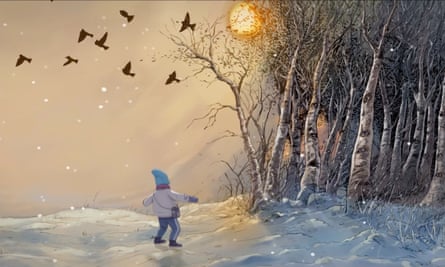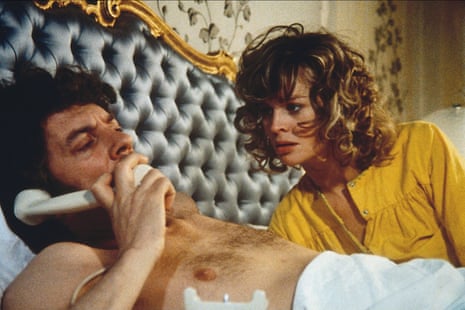To those of us already signed up for a veritable bouquet of streaming services – all with monthly subscription fees that are modest individually and unexpectedly hefty as a collective – the announcement of a new one increasingly prompts some stringent decision-making. Does this one offer you something substantial you don’t get from those ones? Which one can you live without to make room for a newcomer? Or are you willing to simply add it to the growing pile?
With all this in mind, StudioCanal’s new platform, StudioCanal Presents, has a stronger selling point than most. In its 34-year history, the Paris-based distributor and production company has built up one of the largest film libraries in the world, digging into the vaults of everything from Ealing Studios to Studio Ghibli. StudioCanal Presents, available for £4.99 via the Apple TV app (with a week-long free trial for the wary), has been built to show off those wares. It launched recently with a selection of more than 100 titles from its library, with more to be added on a monthly basis, many of them exclusive to the platform.
Its starter pack, as it were, is a pretty indicative cross-section of what its archive has to offer, spanning crowdpleasers and art films, classics and newer favourites, with British and French cinema – per the company’s origins – particularly well represented in the international mix. StudioCanal’s selection of British classics includes plenty of rightly canonised titles: the eternally jittery, shivery noir of Carol Reed’s The Third Man, the foxy comedy of Ealing stalwarts Kind Hearts and Coronets and The Ladykillers, the still-startling candour of Ken Loach’s debut feature, Poor Cow, or the nervy, sensual modernism of Nicolas Roeg’s endlessly imitated psychological horror Don’t Look Now.
But I was pleased to find a few films that aren’t celebrated today as much as they deserve to be. Bryan Forbes’s lovely, quietly compassionate 1962 adaptation of Lynne Reid Banks’s The L-Shaped Room, about a young pregnant Frenchwoman seeking allies in a west London boarding house, still rings perceptively true in its depiction of the mixed messages Britain gives to new arrivals. From the same era of new British realism, Guy Green’s The Angry Silence probes labour politics and working-class financial despair with a determined vigour – interpreted as anti-strike in its day – that could still prompt debate now. Moving away from realism entirely, there’s rainy-Sunday teatime escapism in the lavishly camp, star-encrusted 1970s version of Agatha Christie’s Death on the Nile, should you want a corrective to the wooden Kenneth Branagh take currently in cinemas.
Crossing the Channel, the French New Wave gets a look-in, with Jean-Luc Godard’s form-changing Breathless, René Clément’s icy yet sun-scorched Ripley tale Purple Noon and Alain Resnais’s dreamily deconstructed romance Last Year at Marienbad among the selections. At the more recent end of French culture, the compulsive, suitably twisty policier series Spiral is a highlight of the platform’s TV selection, along with the louche, bespoke-tailored nastiness of Hannibal, the 2013 Hannibal Lecter origin series with an ideally cast Mads Mikkelsen, well worth bingeing for the first or 14th time.

Latter-day cinema selections range from the brash gangster spectacle of Tom Hardy’s dual Kray brothers performance in Legend to Steven Soderbergh’s underrated, southern-fried heist romp Logan Lucky to the perverse, tar-dark Korean woman-on-a-mission mystery of Bong Joon-ho’s Mother – every bit the equal of the director’s more popular Parasite. And should you somehow have missed two of the essential American films of the past decade – the Coen brothers’ wintry, elegiac folk throwback Inside Llewyn Davis and Todd Haynes’s all-time romantic swoon Carol – a double feature of those is worth the month’s fiver already.
Also new on streaming and DVD
Human Rights Watch film festival
The travelling international festival of progressive, socially conscious cinema holds its London edition from 17-25 March, with the entire programme also available to stream digitally in the UK and Ireland during that time. It’s a fresh, exciting selection of documentary and narrative work: highlights include the recently Berlin-awarded Myanmar Diaries – an urgent, searing journal by anonymous film-makers of the past year under military rule – and Eternal Spring, an inspired mixed-media reflection on Chinese police persecution of Falun Gong activists, its lively animation drawn from the comic-book aesthetic of exiled artist Daxiong.

La Civil
(Signature)
When her teenage daughter is kidnapped by a cartel and the authorities in northern Mexico prove no help, single mother Cielo takes matters into her own hands. That premise may make Teodora Mihai’s arresting debut sound like a standard-issue vigilante thriller, but it’s something else altogether: tensely riveting, yes, but rich in social texture as it ponders a national history of violence.
Feast
(Mubi)
Dutch director Tim Leyendekker’s radical, haunting hybrid documentary takes as its subject a case that could be vulnerable to lurid true crime treatment, in which three Dutch men held a series of sex parties where guests were drugged and injected with HIV-infected blood. But Leyendekker avoids sensationalism, instead probing emotional motivations from multiple perspectives over the course of seven reconstructed vignettes.

Comments (…)
Sign in or create your Guardian account to join the discussion